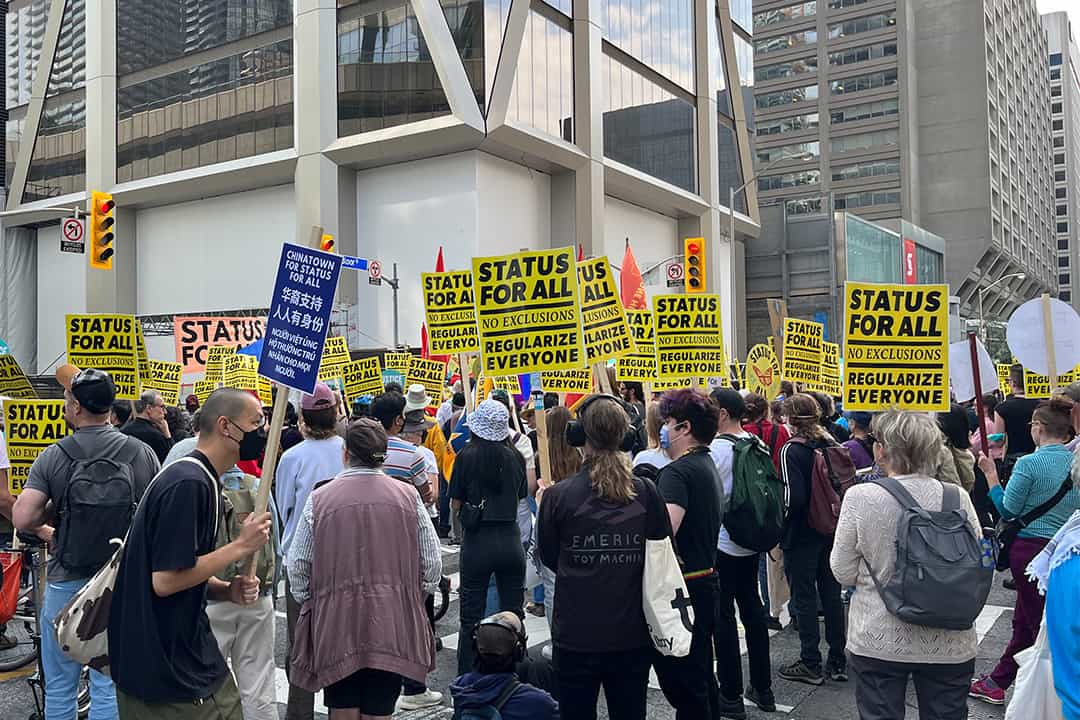On September 17, the Migrant Rights Network (MRN) held a rally at the Bloor-Yonge intersection calling on the federal government to grant permanent resident status for all undocumented migrant workers in Canada. The MRN is a national coalition of migrants that advocates for a simplified and inclusive path to obtain citizenship and permanent residency status for non-permanent residents such as migrant workers, international students, and refugees. The protest took place as part of MRN’s national day of action, which included protests in 15 cities across the country.
Members of the Canadian Federation of Students (CFS) — a national organization representing students’ interests — attended the protest. At the event, a spokesperson for the group noted similarities between the issues faced by international students and migrant workers, calling on the government to grant permanent resident status to all migrant workers and international students in Canada.
The protest
The protest began at the intersection of Bloor Street and Yonge Street, and attendees then marched down Yonge Street to Yonge-Dundas Square while chanting, “Migrant workers are welcome here!” and “Status now!”
“It’s so important that we’re here today, because the government needs to hear us loud and clear,” Deena Ladd, who works at MRN’s Workers’ Action Centre, told the audience in her speech at the rally. Ladd said that undocumented migrant workers often face wage theft, exploitation, and discrimination.
“[Employers] know that they can abuse and threaten [migrant workers] with deportation or with the cops if [migrant workers] ask just for their wages,” continued Ladd.
On September 6, the United Nations Human Rights Office of the High Commissioner called on Canada to “do more to protect workers and offer a clear pathway to permanent residency for all migrants.” Following a 14-day visit to Canada, UN Special Rapporteur Tomoya Obokata reported that “Employer-specific work permit regimes, including certain Temporary Foreign Worker Programmes, make migrant workers vulnerable to contemporary forms of slavery, as they cannot report abuses without fear of deportation.”
Michael Hewlett, one of the protesters, told The Varsity that migrant workers are not given the same rights as other workers despite them working tirelessly to make Canada a better place. “[The protest] is a way to bring attention to politicians and people who can make the decisions, that enough of us care about this, for [politicians] to start caring about [migrants] too.”
The Royal Canadian Mounted Police estimated that there were between 200,000 to 500,000 residents in Canada without documentation from the Canadian government in 2007 — which is their most recent estimate of the number of undocumented residents in the country. According to the Canadian government’s Standing Committee on Citizenship and Immigration, people without federal documentation of residence or immigration cannot usually fully exercise their legal rights at work due to fear of deportation, and they often face exploitation and discrimination from their employers.
Ontario is one of the only provinces to provide basic healthcare at no cost to undocumented immigrants, with 22 health centres in Toronto providing medical services to undocumented people. However, a 2023 paper published in the Journal of Migration and Health notes that many of these centres lack the capacity or resources to take on many patients, and said that undocumented newcomers have trouble accessing their services.
Students’ role
Members of the Canadian Federation of Students–Ontario Chapter (CFS-Ontario) attended the protest. CFS-Ontario — part of the national CFS — lobbies the government on behalf of students from across the province. The University of Toronto Students’ Union, the University of Toronto Graduate Students’ Union, the University of Toronto Mississauga Students’ Union (UTMSU), and the Association of Part-Time Undergraduate Students of the University of Toronto are all members of the CFS.
In a statement to The Varsity, Mitra Yakubi — who served the UTMSU’s president from 2020 to 2022 and is currently the CFS-Ontario executive at large — wrote that solidarity with migrant workers is essential to achieve free and accessible education. Yakubi noted that, like migrant workers, international students and others under precarious status experience xenophobia, racism, and exploitation.
“International students and migrant workers should also have free access to social programs such as healthcare, regardless of their status,” Yakubi added. Ontario does not provide free health insurance for international students, unlike some other provinces such as Alberta, British Columbia, and Saskatchewan.
“[The CFS] strongly supports the call for status for all including international students, migrant students and workers who face exploitation and discrimination due to their precarious status,” wrote Yakubi.



No comments to display.